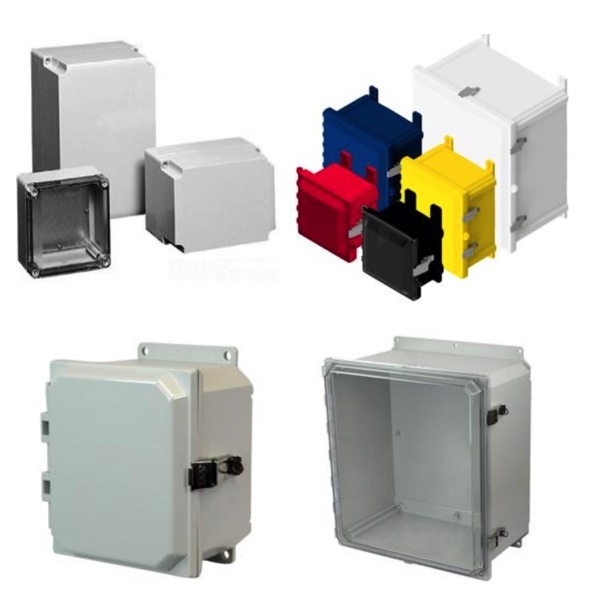Polycarbonate Electrical Enclosures

Polycarbonate enclosures play a critical role in protecting sensitive electrical controls and components in both indoor and outdoor environments. These polycarbonate enclosures are lightweight yet highly impact resistant, making them a dependable solution for industrial automation, commercial installations, and utility applications. Their non-metallic construction provides excellent resistance to corrosion, moisture, and UV exposure, helping maintain long-term performance in harsh conditions.
Compared to stainless steel or fiberglass alternatives, polycarbonate enclosures offer a lighter and often more cost-efficient option without sacrificing durability. Popular options such as Hoffman polycarbonate enclosures are widely used for control panels, junction boxes, and instrument housings where environmental protection and ease of installation are required. Polycarbonate enclosures are compatible with a wide range of accessories, including DIN rails, cable glands, vent kits, and thermal management components, allowing flexible system design while maintaining clean cable routing and reliable protection.
FAQs
Q: Can DIN rail be installed on the walls or panels of polycarbonate enclosures?
Yes, DIN rails can be mounted inside polycarbonate enclosures to support accessories, terminal blocks, and control components. This allows organized layouts and flexible mounting configurations within the enclosure.
Q: Why are polycarbonate enclosures commonly used for outdoor applications?
Polycarbonate enclosures provide strong resistance to impact, moisture, UV exposure, and corrosion. Their non-metallic construction makes them well suited for outdoor installations where long-term environmental durability is required.
Q: What performance ratings do polycarbonate enclosures typically meet?
Most polycarbonate enclosures meet NEMA and IP ratings suitable for protection against dust, water, and harsh environmental conditions. These ratings make them appropriate for commercial, industrial, and utility installations.
Q: How do clear-cover polycarbonate enclosures support system monitoring?
Clear covers allow visual inspection of internal components without opening the enclosure. This helps maintain environmental seals while enabling faster system checks and reduced maintenance time.
Q: What makes Stahlin polycarbonate enclosures unique?
Stahlin polycarbonate enclosures are known for their heavy-duty construction, thick wall designs, and molded features that enhance strength and environmental sealing. These enclosures are often selected for demanding outdoor and industrial applications where long-term durability and protection are critical.
Why Buy Polycarbonate Enclosures from RSP Supply
RSP Supply offers a broad selection of polycarbonate enclosures to support electrical, automation, and industrial control applications. Our lineup includes trusted manufacturers such as Hoffman polycarbonate enclosures and other non-metallic solutions designed to meet demanding environmental requirements. Customers rely on RSP Supply for dependable product availability, technical expertise, and enclosure solutions that deliver consistent protection and long-term performance across a wide range of applications.

